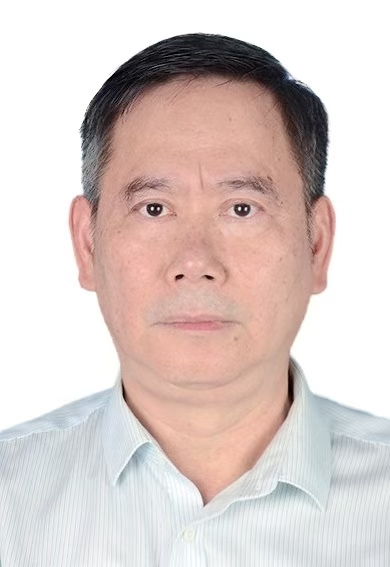个人简介

潘宝成 副教授
学习及工作经历
教育 生物物理学 博士,1998年9月
美国俄亥俄州立大学哥伦布分校,生物物理系
固体物理学 硕士,1987年7月
暨南大学, 物理系
物理学 学士,1982年7月
暨南大学,物理系
研究经历
2015 – 现在 副教授,广州新华学院健康学院
2010 – 2015 理论生物学研究
研究和写作《细胞论 -- 生物学的理论探索》。
“On the Living Cell – A Theoretical Exploration of Biology”
2009 – 2010 副研究员 (实验室: 熊勇)
耶鲁大学,分子生物物理和生物化学系
先天免疫系统对HIV 感染反应的结构和功能研究
2003 - 2009 博士后研究员(实验室:Thomas A. Steitz,2009年诺贝尔化学奖得主)
耶鲁大学,分子生物物理和生物化学系
CCA-adding酶的结构和功能研究
T7 RNA 聚合酶的转录终止机理的结构研究
1998 – 2003 博士后研究员 (实验室: Muttaiya Sundaralingam,俄亥俄杰出学者)
俄亥俄州立大学哥伦布分校,化学系
RNA 四螺旋体的结构研究
寡核苷酸和药物分子相互作用机理的结构研究
1994 - 1998 研究助理 (导师: Muttaiya Sundaralingam,俄亥俄杰出学者)
俄亥俄州立大学哥伦布分校,化学系
RNA 错误配对的结构研究
1990 - 1994 研究助理 (导师: Elizabeth L. Gross)
俄亥俄州立大学哥伦布分校,生物物理系
蛋白质的折叠机理的生物化学和生物物理学研究
教学经历
2015 - 现在 副教授,中山大学新华学院,资讯管理系
理论生物学,生物化学,大学物理,医用物理学,线性代数
眼视光应用光学,医学英语。
1994 - 1998 助教,俄亥俄州立大学哥伦布分校,化学系
普通化学
1990 - 1994 助教,俄亥俄州立大学哥伦布分校,生物化学系
普通生物学
1987 - 1990 教师,暨南大学,物理系
量子力学,电动力学,数学物理方法,普通物理学
1982 – 1984 教师,广州民航学院
普通物理学
学术成果
26. Pan, B. (2018) On the Living Cell -- A Theoretical Exploration of Biology. Guangzhou, Sun Yat-sen University Press.
25. Pan, B., Xiong, Y. & Steitz, T. A. (2010) How the CCA-adding enzyme selects adenine over cytosine at position 76 of tRNA. Science 330, 937-940.
24. Yang, H., Wang, J. Jia, X. McNatt, M. W., Zang, T., Pan, B. Meng, W., Wang, H., Bieniasz, P. D., Xiong, Y. (2010) Structural insight into the mechanisms of enveloped virus tethering by tetherin. Proc. Natl. Acad. Soc. USA 107, 18428-18432.
23. Pan, B., Shi, K. & Sundaralingam, M. (2006) Base-tetrad swapping results in dimerization of RNA quadruplexes: implications for formation of the i-motif RNA octaplex. Proc. Natl. Acad. Soc. USA 103, 3130-3134.
22. Pan, B., Shi, K. & Sundaralingam, M. (2006) Crystal structure of an RNA quadruplex containing inosine tetrad: implications for the role of NH2 group in purine tetrads. J. Mol. Biol. 363, 451-459.
Pan, B., Shi, K. & Sundaralingam, M. (2004) Synthesis, purification and crystallization of Guanine-rich RNA oligonucleotides. Biol. Proced. Online 6, 257-262.
20. Shi, K., Pan, B., Tippin, D. & Sundaralingam, M. (2004) Structure of d(Gm5CGm5CGCGC) and d(GCGCGm5CGm5C): effects of methylation on alternating DNA octamers. Acta Crystallogr. D 60, 61-65.
19. Eswaramoorthy, S., Rao, S. T., Pan, B. & Sundaralingam, M. (2004) Structure of the dodecamer r(GAUCACUUCGGU) with four 5’-overhanging nucleotides. Acta Crystallogr. D 60, 8-12.
18. Deng, J., Pan, B. & Sundaralingam, M. (2003) Structure of d(ITITACAC) complexed with distamycin at 1.6 Å resolution. Acta Crystallogr. D 59, 2342-2344.
17. Pan, B., Xiong, Y., Shi, K. & Sundaralingam, M. (2003) Crystal structure of a bulged RNA tetraplex at 1.1 Å resolution: implications for a noval binding site in RNA tetraplex. Structure 11, 1423-1430 (previewed).
16. Shi, K., Pan, B. & Sundaralingam, M. (2003) Structure of a B-form DNA/RNA chimera (dC)(rG)d(ATCG) complexed with daunomycin at 1.5 Å resolution. Acta Crystallogr. D 59, 1377-1383.
15. Pan, B., Xiong, Y., Deng, J., Shi, K. & Sundaralingam, M. (2003) Crystal structure of an RNA purine-rich tetraplex containing adenine tetrads: implications for specific binding in RNA tetraplexes. Structure 11, 815-823.
14. Pan, B., Xiong, Y., Shi, K. & Sundaralingam, M. (2003) An eight-stranded helical fragment in RNA crystal structure: implications for tetraplex interaction. Structure 11, 825-831.
13. Deng, J., Xiong, Y., Pan, B. & Sundaralingam, M. (2003) Structure of an RNA dodecamer containing a fragment from SRP domain IV of Escherichia coli. Acta Crystallogr. D 59, 1004-1011 (cover story).
12. Shi, K., Pan, B. & Sundaralingam, M. (2003) The crystal structure of an alternating RNA heptamer r(GUAUACA) forming a six base-paired duplex with 3’-end adenine overhangs. Nucleic Acids Res. 31, 1392-1397.
11. Ravelli, R. B. G., Leiros, H.-K. S., Pan, B., Caffrey, M. & McSweeney, S. (2003) Specific radiation damage can be used to solve macromolecular crystal structures. Structure 11, 217-224.
10. Pan, B. & Sundaralingam, M. (2003) Crystal structure of rGd(CGCGCG): a Z-DNA hexamer duplex with a 5’-(rG) overhang. Acta Crystallogr. D 59, 433-437.
9. Ramakrishnan, B., Sekharudu, C., Pan, B. & Sundaralingam, M. (2003) Near-atomic resolution crystal structure of an A-DNA decamer d(CCCGATCGGG): cobalt hexammine interaction with A-DNA. Acta Crystallogr. D 59, 67-72.
8. Sundaralingam, M. & Pan, B. (2002) Hydrogen and hydration of DNA and RNA oligonucleotides. Biophys. Chem. 95, 273-282.
7. Pan, B., Mitra, S. N. & Sundaralingam, M. (1999) Crystal structure of an RNA 16-mer duplex r(GCAGAGUUAAAUCUGC)2 with non-adjacent G(syn)A+(anti) mispairs. Biochemistry 38, 2826-2831.
Pan, B. & Sundaralingam, M (1999) Mismatches in RNA Crystal Structures: Base Pairing, Base
Stacking. Perspectives in Structural Biology, 521-544 (Book Chapter).
5. Pan, B., Sundaralingam, M. (1999) Mismatched Base Pairing in RNA Crystal Structures. Int. J. Quantum Chem. 75, 275-287.
4. Pan, B., Mitra, S. N. & M. Sundaralingam (1998) Structure of a 16-mer RNA duplex r(GCAGACUUAAAUCUGC)2 with wobble CA+ mismatches. J. Mol.Biol. 283, 977-984.
3. Pan, B., Mitra, S. N., Sun, L., Hart, D. & Sundaralingam, M. (1998) Crystal structure of an RNA octamer duplex r(CCCIUGGG)2 incorporating tandem IU wobbles. Nucleic Acids Res. 26, 5699-5706.
2. Pan, B., Ban, C., Wahl, M. C. & Sundaralingam, M. (1997) Crystal structure of d(GCGCGCG) with 5'-overhang G residues. Biophys. J. 73, 1553-1561.
1. Gross, E. L., Draheim, J. E., Curtiss, A. S., Crombie, B., Scheffer, A., Pan, B., Chiang, C. & Lopez, A. (1992) Thermal denaturation of plastocyanin: the effect of oxidation state, reductants, and anaerobicity. Arch.Biochem.Biophys. 298, 413-419.
研究方向
我的科学研究领域包括结构生物学和理论生物学。结构生物学的研究重点是蛋白质与核酸相互作用的分子机理和生物过程的基本原理以及药物分子与核酸的相互作用,其成果发表在《科学》、《美国国家科学院院刊》等科研刊物,共计20余篇。理论生物学的研究主要是对生命系统的基本原理和规律进行理论探索。以生物学的自主性为基础,提出了生命系统的属性二象性的概念:即生命系统同时具有物理化学属性和生物学属性。物理化学属性遵循物理科学的规律和原理,而生物学属性遵循不同的规律和原理。正是生命系统的这种生物学属性使生物学成为一门自主的独立学科。生命系统的行为特征主要取决于生命系统的生物学属性。在细胞水平上,生物学的理论框架由生存公理和四个基本假设组成。这些结果包括在理论生物学专著《细胞论-生物学的理论探讨》中。